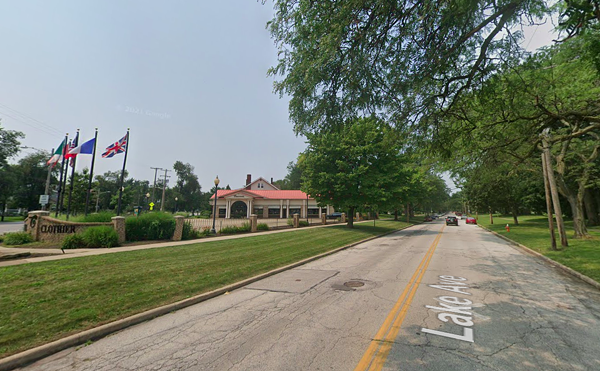Melvin Lalich is a man at peace with his lot in life. A former mortgage broker, he's made his living for years by flipping homes in and around Cleveland: buying low and selling high, and leaving his corner of the neighborhood a little better than he found it.
"You know that ball on the back of a toilet?" Lalich asks. "I don't. I don't know shit about anything, but I know real estate. I take the worst houses in the city and make them the best houses in the city." It's not just his opinion: His rehabs have garnered praise from Cleveland officials too.
So it was that Lalich joined his brother-in-law in buying the home they now own on Franklin Boulevard in Ohio City. It's an ungainly, sprawling Victorian two doors down from the infamous Franklin Castle. Built in 1870, the home served for years as a boarding house for cleaned-up drunks, until its owner put it on the market in 2006.
After four years without a nibble, Lalich stepped in early this year with an offer of $26,000 — a fraction of what other homes in the former Millionaires' Row sell for, but only a few thousand less than asking price. The place, after all, was a dump.
Before signing off, Lalich paid a visit to Cleveland's building department, where he secured written confirmation that the home was zoned for commercial use. His plan was to plunge tens of thousands of dollars into sprucing up the old lady, then court a buyer with commercial aspirations. Given its chopped-up floor plan, it had no future as a family residence, he figured.
From winter through summer, contractors trampled throughout the house's countless rooms and cubbyholes, mending trashed walls and ceilings, and replacing the heating and cooling, plumbing, and electrical systems — all in conformity with the commercial requirements set forth by the city. Today, it's a move-in-ready dwelling that sleeps 11 comfortably, though not amid the grandeur one might expect from a 19th-century mansion.
By August, it seemed Lalich had lined up the perfect suitor: an East Side businessman with designs on opening a European-style youth hostel in Ohio City. The plan called for international travelers to drop their backpacks, rest up, and be wooed by Ohio City's innumerable charms — from its bars and restaurants, to its enchanting West Side Market.
The idea wasn't new to the neighborhood: For years, the Ohio City Near West Development Corporation has made known its zeal for bringing such a venue to town. "We've eyed a hostel as something the city of Cleveland needs, and we think Ohio City would be the perfect place for it," says the group's director, Eric Wobser.
But when Lalich's potential buyer visited the building department to confirm the place was properly zoned, the city had reversed itself. Ronald O'Leary, the department's assistant director, decreed that the home could be used only for residential purposes.
O'Leary, it appeared, had a personal stake in the verdict: His own home — an elegant Victorian on a large lot — sits two doors down from Lalich's place.
When Lalich explained that the department had already approved the commercial use in writing, O'Leary deferred the ruling to a city lawyer and another official in the department. They sided with Lalich.
Not content with the outcome, O'Leary filed an appeal against his own department. He cited an arcane code claiming that the home's zoning had reverted to residential because it was abandoned for more than two years. Never mind that the home, with its numerous architectural modifications over the years, likely hadn't been a single-family residence since the Depression.
Lalich claims the house was simply on the market, not abandoned, and the previous seller says the same. Asked by Scene whether the code has been invoked with any other Cleveland home in recent memory, O'Leary says he does not know.
In mid-November, less than a week before O'Leary's appeal was to be heard, Lalich's buyer backed out, citing cold feet from the growing scrutiny over what he could do with the place.
Councilman Joe Cimperman says Lalich has done "an amazing job at a property that was in distress." The problem, he says, stems not from Lalich's plans, but from residents' concerns about how neighboring houses are used.
The strip of Franklin includes many gorgeously restored homes, in addition to the star-crossed Franklin Castle and several large old houses, like Lalich's, that have served for years as boarding houses. If one of them is allowed to circumvent the law, what will stop others from following? goes the logic of Cimperman and area residents, fearful that their recession-strafed houses will sink further in value.
Lalich counters that he's not trying to circumvent any laws — he's simply trying to follow through with plans the city had approved for him.
But more recent amendments by the building department have made that harder than ever: When the permit was issued against O'Leary's wishes, a stipulation was added that the dwelling must be used as a hostel.
"That is the most limited zoning I have seen for a property in my entire life," says Lalich. With his hostel-savvy suitor now out of the picture, Lalich worries he's sitting on a house that has been customized at the behest of the city to appeal to no buyer on earth. As he puts it: "Now I can only sell the house to purple unicorns or leprechauns."
Lalich paints O'Leary as a calculating meddler who fought his department's own ruling solely for personal reasons.
O'Leary admits that his own stake in the outcome made it best for him to drop the appeal. But he's happy to see that a group of neighbors has united to file a new appeal. Also onboard is Ohio City Near West, which would rather see a hostel take root in the city center.
"The fact that my wife and I were involved with this was becoming much more of a deal than whether this should become a hostel," O'Leary says. "My neighbors and my wife and I don't wish anyone any ill will. It's just something we looked at that's best for the neighborhood."
For now, Lalich awaits word about the appeal against him. If he loses, he'll mount an appeal of his own. To him, it's all part of the City Hall shell game he's grown to know all too well.
"I can't think of a single thing I could have done to prevent this," he says. "But this is going to drive me to bankruptcy."
Send feedback to eburnett@clevescene.com.













